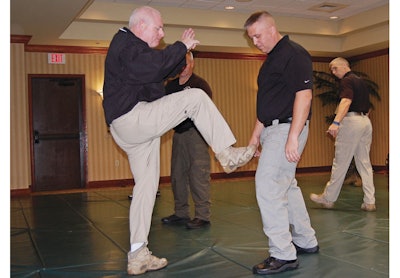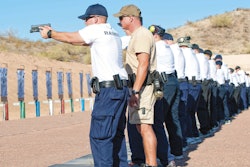 Photo courtesy of Amaury Murgado.
Photo courtesy of Amaury Murgado.
You probably hear about needing to have a warrior mindset almost daily. Books are published about it, motivational speakers make money speaking of it, and while attending in-service training, we shake our heads in obvious agreement when someone lectures about it. But what do you really think? Are your attitude and mindset real tools or are you just buying into the hype? Do you even know what a true warrior is, let alone the mindset of such a person?
Some Definitions
Let's first define what a warrior is. In general, a conventional definition for warrior is "someone who is engaged in or experienced in battle." But this definition goes only so far, as it relates to those fighting in a war. A more encompassing definition of a warrior for law enforcement is "one who is engaged aggressively or energetically in an activity, cause, or conflict." I believe this to be a better working definition because it broadens the scope and therefore who can be involved with it.
Certainly those in law enforcement are put in harm’s way and experience their own form of battle. And you can be considered a warrior if you completely commit yourself, mind, body, and soul. In order to do that, however, a warrior must make daily sacrifices for his or her cause. These sacrifices include developing a set of attitudes that will reign above all others. Everything a warrior does will revolve around them.
An attitude generally means a state of mind, feeling, and disposition. It also means how a person views something or tends to behave toward it. This is why attitude is always such an important topic in law enforcement; it speaks to your behavior. The behavior that is created from these attitudes therefore becomes your mindset.
A mindset is developed when you employ a fixed mental attitude that predetermines your response to a given situation. For example, your attitudes toward something help develop your response or approach. Your mindset becomes your approach.
Say for example you hate coming in on a day off for in-service training. You then form the mindset that you don't want to be there so you sit in the back and play with your smartphone the whole time. Your mindset guides what you do and how you do it. Therefore, having a warrior mindset means having a positive focus about your mission and demonstrating the appropriate behavior to back it up.
Understanding Mindsets
If you are looking for a good all-in-one reference on the topic, I suggest reading "Warrior Mindset," cowritten by Dr. Michael J. Asken. I had the privilege of hearing him speak at the first South East Warrior Symposium held in Orlando, Fla., this past February. In the book, Asken writes, "…experience shows that up to 90% of successful performance is attributed to psychological skills. Rarely is that number reported to be less than 40%. This comes from talking to military personnel, police officers, including SWAT tactical team members, and other emergency responders who engage in life and death situations."
That's huge when you consider how little training we receive in the psychological aspects of performing our jobs. Think about your own training; how much time does your agency spend on molding mindset?
Most agencies will shoot, punch, and drive consistently. Administrators use this type of training to keep their agency’s liability down and help meet with accreditation standards. But if your agency focuses solely on liability, what does that say about the brass' mindset? Are decision makers concerned about your safety and survival or are they more worried about being sued? I would hope that agency leaders are worried about both.
In my opinion, of all the tools a police officer has at his or her disposal, the mind is the most important, and yet it's the least understood. In contrast, sports organizations have incorporated psychological training into their performance training for decades. It hasn't been until recently that we in law enforcement have realized how important a role the mind plays in our day-to-day operations and are finally giving it some attention.
Warrior Mindset
In the book "Warrior Mindset," Lt. Col. Dave Grossman says, "In the end, it's not about the 'hardware,' it's about the software. Amateurs talk about hardware or equipment, professionals talk about software or training and mental readiness." In other words, another way of looking at warrior mindset is with mental readiness.
Everyone knows what it feels like doing something for the first time. You are unsure of yourself and you overthink it. You sometimes second guess yourself to the point of inaction. A big part of your success depends on your mental readiness to see it through. You have to be prepared for the difficulties that lie ahead and drive on.
Former Navy Seal and author of "Unleash the Warrior Within" Richard Machowicz says it clearly: "Being a warrior is not about the act of fighting. It’s about being so prepared to face a challenge and believing so strongly in the cause you are fighting for that you refuse to quit." In those few words lie not only a great definition for being a warrior, but also what I feel are the keys to having a successful warrior mindset: preparation and believing.[PAGEBREAK]Prepare
In his book, Asken goes on to say that "Because the brain (and the mind) exists in the environment of the body, the quality of that environment is an essential factor in the quality of psychological function." In other words, you can maximize the use of your mind all you want, but if you're a couch potato, you're probably not going to do well in a stressful situation.
Working out, eating right, and getting enough sleep are critical factors toward developing your peak performance. Not that this is anything new, but it's advice we continue to ignore and pay the ultimate price for doing so. You can't afford to break the mind-body connection and expect your peak performance to be there when you need it the most.
It's not about training for the Olympics either. There are knuckle draggers that would have you believe if you’re not throwing up, you're not working out. And that couldn't be further from the truth. Though there are exceptions at every agency I've ever worked with, you can't expect a 55-year-old to train the same way a 25-year-old does.
To maintain a positive mind-body connection, your goal is to maximize your own conditioning, maintain a high number of abilities, and increase your tolerance for stress. True peak performance has never been about how much weight you can lift or how far you can run; it's been about operating optimally under long periods of intense stress. That’s the secret to surviving and winning.
I've seen this very principle at work on the Discovery Channel's TV shows "Out of the Wild: Venezuela" and "Out of the Wild: The Alaska Experiment." For each show they pick nine ordinary people, give them three days’ worth of survival training, and then ask them to survive in extreme conditions for almost 30 days while traveling upward of 70 miles. Usually by the third day, the combination of hiking, climbing, extreme climate, and lack of sleep and food are affecting everyone. You can see firsthand how both physical and psychological stress take their toll.
The point it brings home to me is that the people with the best attitudes and strongest survival mindsets are the ones that make it all the way through. It’s not always the biggest and strongest who make it, but those with the most heart; those who keep on going no matter what is thrown at them. It's a lesson you need to remember if you want to become a true warrior.
Believe
You've heard people say that if you can see it you can achieve it. Well, there's a reason for that. Mental imagery, or visualization, is one of the most powerful skills you can use to enhance mental toughness and performance. It’s not used as a substitute for hands on training, but to supplement it. Research has shown that if you prepare mentally and believe you can accomplish a task, you will increase your chances of success. If you allow negative thoughts and doubts to enter in, they will decrease your chances of success.
A simple form of imagery training goes something like this. You first think about the action you are about to practice. You go over it in your mind and imagine yourself doing the task while sitting or standing quietly. Next, you think about it again but you go through the motions almost in a pantomime fashion. You might have seen someone with his eyes closed talking to himself, moving around and pretending to perform a task. Although he may look like he's in a trance, he’s not crazy; it's just a form of cognitive rehearsal. The last part of this of course is actually practicing the task.
This type of training helps create a bridge between the psychological and physical aspects of what you are trying to accomplish. If you incorporate this into your training, new skills won’t seem so new when you try them for the first time. Mere repetition will not do the trick; you have to go beyond just going through the numbers. You have to want to be successful and you have to see yourself being successful as you perform each task. You need to have a single-minded focus.
Overcome and Win
Some of us are already warriors in one form or another. Being a warrior means throwing your heart and soul into something you believe in and never looking back. Having a warrior mindset means you won't quit. It encompasses the Spartan philosophy of bringing back your shield or being carried back on it.
Having a warrior mindset means doing whatever it takes to be prepared because warriors don't just survive, they overcome and win. At the end of the day, life is nothing but a mind game; it's important that you play to win. Your life depends on it.
Think Like a Warrior
- A warrior is one who is engaged aggressively or energetically in an activity, cause, or conflict.
- An attitude is how a person views something or tends to behave toward it.
- Mindset comes from employing a fixed mental attitude that predetermines your response to a given situation.
- The keys to a warrior mindset are preparing and believing.
- It's all a mind game; how you play is totally up to you.
Amaury Murgado is a special operations lieutenant with the Osceola County (Fla.) Sheriff's Office. He has 25 years of law enforcement experience, is a retired master sergeant from the Army Reserve, and has been a lifelong student of martial arts.
Related:













